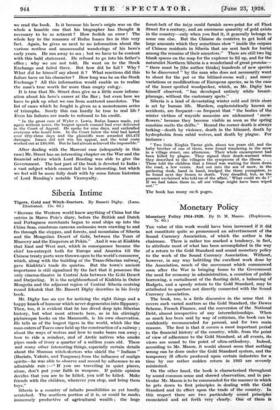Siberia Intime
Tigers, Gold and Witch-Doctors. By Bassett Digby. (Lane. Illustrated. 12s. 6d.) " BEFORE the Western world knew anything of China but the entries in Marco Polo's diary, before the British and Dutch and* Portuguese merchants began to send ships up into the China Seas, cumbrous caravan embassies were crawling to and fro through the steppes, and forests, and mountains of Siberia and the Mongolian Desert of Gobi, between the Tsars of Muscovy and the Enaperors at Pekin." And it was at Kiakhta that East and West met, which in consequence became the chief tea-entrepet both for Europe and Ainerica till the Chinese treaty ports were thrown open to the world's commerce, which, along with the building of the Trans-Siberian railway, gave Kialchta's trade its quietus. But the town's ancient importance is still signalized by the fact that it possesses the only cinema-theatre in Central Asia between the Gobi Desert and Darjeeling. It is the neighbourhood of Kiaklita in Outer Mongolia and the adjacent region of Central Siberia centring round Irkutsk that Mr. Bassett Digby describes in his lively
• book.
Mr. Digby has an eye for noticing the right things and a ' happy knack of humour which never degenerates into flippancy. Then, too, it is evident that he has dived deep into Siberian history, but what most attracts here, as in his stirringly picturesque books on the Mammoth, is his own observation. He tells us of the hugest tigers in the world, which like the man-eaters of Tsavo once held up the construction of a railway ; about the ways of wolves and how to' make bears run away ; how to ride a reindeer, wid of Arctic natives who smoke pipes made of ivory a quarter of a million years old. These and many other interesting things, especially eel-fain details about the Shaman witch-doctors who shield the " Indians " (Buriats, Yakuts, and Tunguses) from the influence of malign spirits—he was able to observe and record by adherence to an admirable rule :—" If you are travelling in quiet places, alone, don't put your faith in weapons. If public opinion decides that you are to be killed, you will be killed. Make friends with the children, wherever you stop, and bring them toys."
Siberia is a country of infinite possibilities as yet hardly scratched. The southern portion of it is, or could be, made, immensely productive of agricultural wealth ; the huge forest-belt of the taiga could furnish news-print for all Fleet Street for a century, and an enormous quantity of gold exists in the country—only when you find it, it generally belongs to some one else. But the Chinese docontrive to get hold of large amounts which they sometimes stow " inside the corpses of Chinese residents in Siberia that are sent back for burial, among the remains of their ancestors." There are still two big
blank spaces on the map for the explorer to fill up, and for the naturalist Northern Siberia is a wonderland of great promise- " there must be [the author thinks] hundreds of new species to be discovered " by the man who does not necessarily want to shoot for the pot or the billiard-room wall ; and many variations or modifications of European species, as in the case of the lesser spotted woodpecker, which, as Mr. Die* has himself observed, " has developed entirely white breast- plumage, without the customary spots." .
Siberia is a land of devastating winter, cold and little store is set by human life. Murders, euphemistically known as accidents, are frequent—so frequent that " the bodies of the winter victims of wayside assassins are nicknamed ' snow- flowers,' because they become visible as soon as the spring sunshine melts the drifts." Round the corner death is always lurking—death by violence, death in the blizzard, death by hydrophobia from rabid wolves, and death by plague. For instance :
" Two little Kirghiz Tartar girls, about ten years old, and the baby brother of one of them, were found wandering in the snow in a village street, one afternoon. Their whole encampment had been killed by plague. They signed their death-warrant when they described to the villagers the symptoms of the illness. . . . These told the children that a friend was waiting for them down the road, a few versts. And out into the sea of snow, in the gathering dusk, hand in hand, trudged the three youngsters, to be found next day frozen to death. Very dreadful, but, as the peasant exclaimed who told me of the affair, ' What could we do ? ' If we had taken them in, all our village might have been wiped out.' "
The book has many su::11 pages.






























 Previous page
Previous page